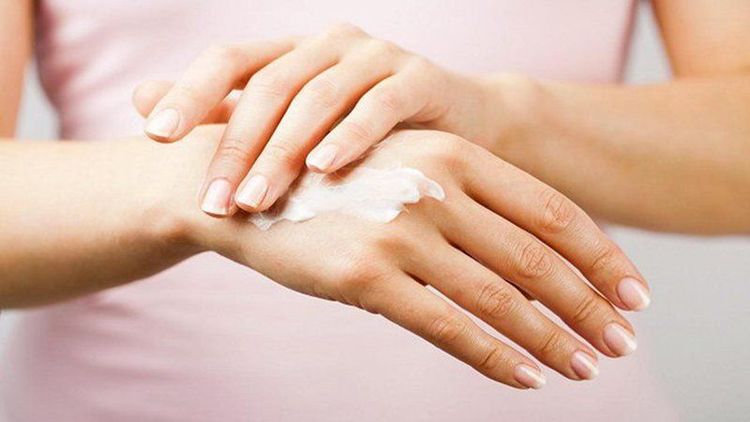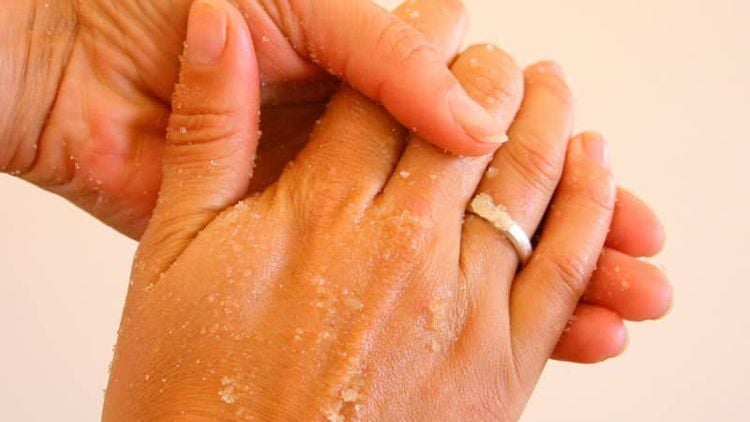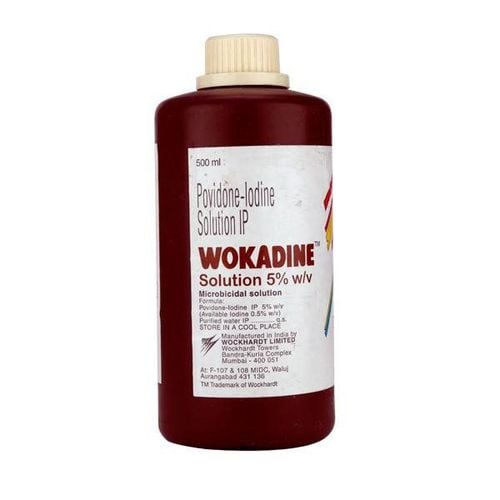This is an automatically translated article.
The article was professionally consulted with Specialist Doctor I Tran Van Sang - Dermatologist - Department of Medical Examination & Internal Medicine - Vinmec Danang International General Hospital.With the COVID-19 outbreak, experts from the World Health Organization (WHO) and the Centers for Disease Control and Prevention (CDC) are constantly broadcasting messages encouraging people to wash their hands frequently. . Routine hand washing is the most effective measure an individual can do regularly to reduce the risk of exposure to the virus. But conversely washing hands also makes the skin of the hands become drier, especially in relatively dry climates or in people who frequently suffer from dry skin.
Washing your hands often can keep you away from bacteria, but it can also affect the skin of your hands. Washing your hands with warm water instead of hot water can keep your hands from drying out. A quick hand sanitizer can be used as a temporary substitute for hand washing in cases where hands are chapped. Whether it is the rapidly increasing Corona pandemic or during the winter, hand washing is one of the most effective ways to prevent the transmission of infectious diseases. Unfortunately, soap and even regular hand washing under hot water will break down the barrier we're all trying to protect, says Dr. Adam Friedman, a professor of dermatology at the George Washington University School of Medicine and Health. , told Healthline. Since everyone is trying to wash their hands more often now to prevent illness, dermatologists have shared these 7 tips that can help keep your skin healthy.
1. Wash with warm water
Daniela Kroshinsky, director of pediatric dermatology and inpatient dermatology at Massachusetts General Hospital, recommends washing your hands for at least 20 seconds with soap and water. About the time enough for 1 hand washing (20 seconds) is enough to sing the song “Happy birthday” twice. Make sure the soap is evenly applied to the backs of your hands, fingers, between your fingers, wrists and fingernails, Kroshinsky told Healthline. She said washing hands under warm water is the best measure, not hot water. The hot water will then dry your hands and won't make the hand wash any better.Lucy Xu, dermatologist and founder of London Premier Laser and Skin Clinic, agrees that hot water washes away, nullifies all hand creams, even anti-inflammatory ones. country. So, instead of washing your hands under hot water, wash them with warm water and plenty of soap.

Rửa tay bằng nước ấm với nhiều xà phòng để hạn chế khô da
2. Use moisturizing soap
Since many soaps can strip our skin and leave us dry and cracked, dermatologist Lucy Xu recommends washing your hands with soap that's moisturizing. For example, a soap with a creamy consistency. You should also look for soaps with ingredients like glycerin and lanolin. Also, try to avoid soap bars.Renee Rouleau, skin care expert and esthetician, also recommends staying away from soap bars. The binders in soap bars have a high pH, which will cause unnecessary dryness. Instead, choose liquid soaps as they are generally less drying to the skin,' Rouleau tells Healthline.
Dermatologist Lucy Xu adds that no matter what soap you use, try to wash your hands gently, don't be too harsh when doing hand washing operations. Even in case you are in a hurry. Try to be gentle so you don't hurt the skin, she says.
3. Apply moisturizer
When water no longer remains on your skin after washing your hands, your hands can become drier. The reason is that water acts like a magnet and it will draw water from the deepest layers of the skin and evaporate into the dry air. The result is even tighter, drier skin. To protect the skin of your hands, apply lotion immediately after washing your hands. Even a light layer will work, says Roul Rouleau.Friedman suggests using moisturizers or ointments instead of lotions, because lotions have too much water content and, therefore, cannot prevent water drainage through the skin. Although the term 'moisturizer' has little scientific meaning – skin is not supplied with an adequate amount of moisture – applying a moisturizer is the primary remedy for imbalances caused by disruption of the skin. skin barrier,” says Friedman. He says moisturizers help take care of the skin because they:
Restore the protective function of the epidermis Provide a layer of protection Increase the water content of the epidermis Soothe the skin Improve the appearance of wrinkles skin

Kem dưỡng ấm tăng hàm lượng nước và tạo lớp bảo vệ da
Occlusive: lanolin acid, stearic acid, capbest/capric triglycerides, mineral oil, paraffin, cyclomethicone, dimethicone, squalene Humectants: sodium pyrrolidine , carboxylic acid, lactate, urea, glycerin, honey, sorbitol Emollient: cyclomethicone, dimethicone, isopropyl myristate, octyl octanoate Mr. Kroshinsky also agrees with the advice of using a moisturizer after every wash, before bed and whenever whenever you feel your skin is dry.
4. Wear gloves
In addition to applying a moisturizer to damp skin after washing your hands, Friedman says soak your hands in water for 5 minutes, then apply moisturizer and wear gloves for 1 to 2 hours. This will ensure that surface moisture penetrates down to its subcutaneous targets, he says.For heavily chapped hands, Xu said moisturizing several times with thick cream and wearing cotton gloves overnight is an effective measure. Like masks, gloves will keep your hands moist for six to eight hours, she says.
Friedman added: Wearing gloves on cold windy days can also keep the dry breeze from contacting and damaging dry skin
5. Use skin care
If you suffer from skin conditions like eczema or psoriasis and find your dry skin is getting drier, rough or cracked from washing more, Xu recommends choosing a skin oil like Vaseline and applying it topically. on the sores or cracks.This will both soothe these areas as well as protect it from becoming even heavier, especially if you're often out on the street which will make your skin worse, she says.
If you have deep cracks, a liquid cream is the most effective solution to make the crack heal faster, says Friedman

Sử dụng các loại dầu dưỡng để cải thiện làn da thô ráp
6. Hand sanitizer as an alternative to soap
If your hands get too chapped when you wash them, Kroshinsky says you can temporarily use hand sanitizer. Hand sanitizer is another option to limit hand washing until your skin has recovered, but not before eating, after going to the bathroom, or when hands are soiled – those are the times. that you need to wash your hands with soap and water, she said.7. Dry hands after washing
When drying hands, a paper towel is best, but if you use a cloth towel, each person in the household should have their own towel and towels should be changed as often as every 3 days. Make sure hands are completely dry, as germs are easier to move and work on on wet hands, she says.Conclusion: So we should wash our hands with warm water (cold water for summer weather) instead of hot water. In addition, it is necessary to use skin moisturizers regularly and dry hands properly after washing.
Source: healthline.com














